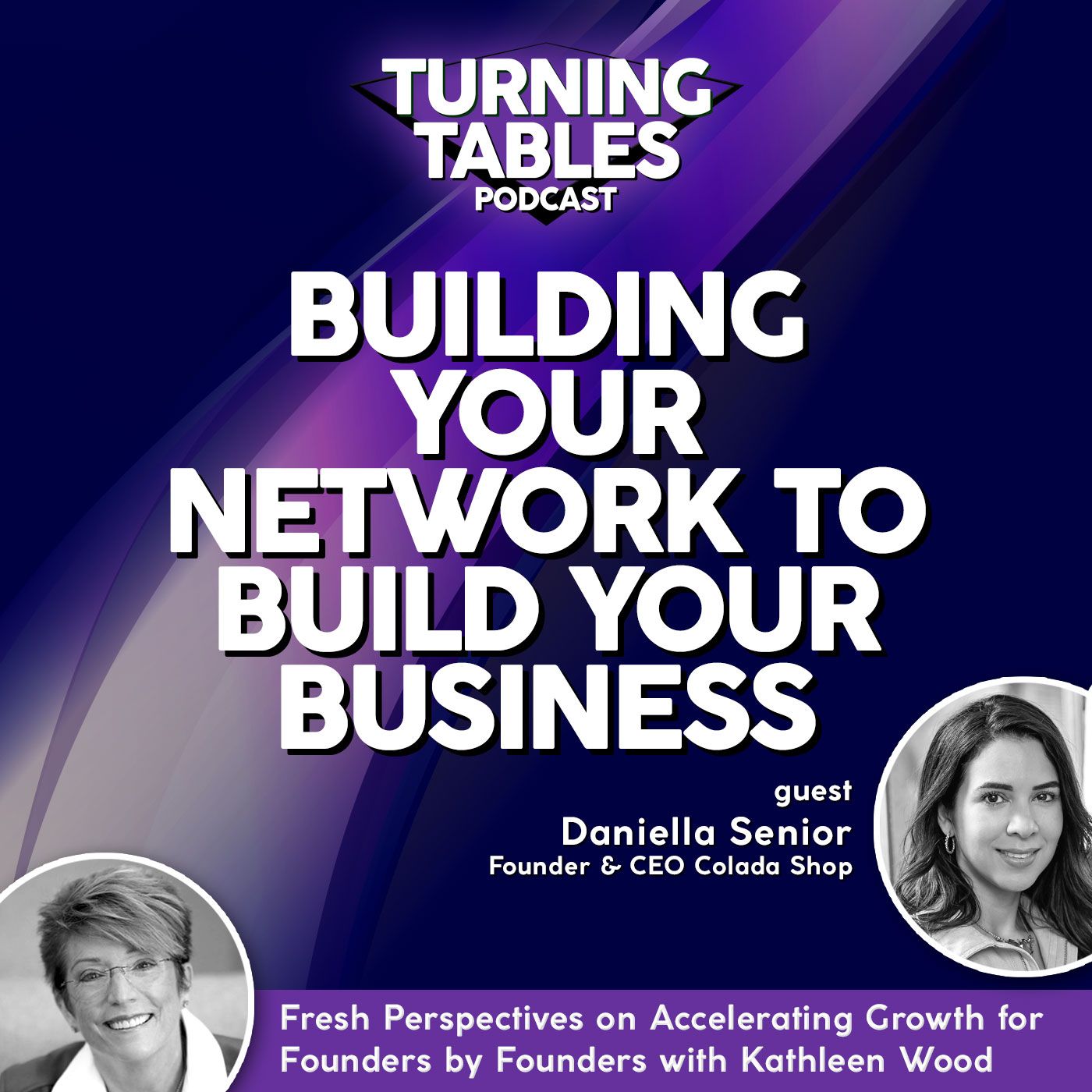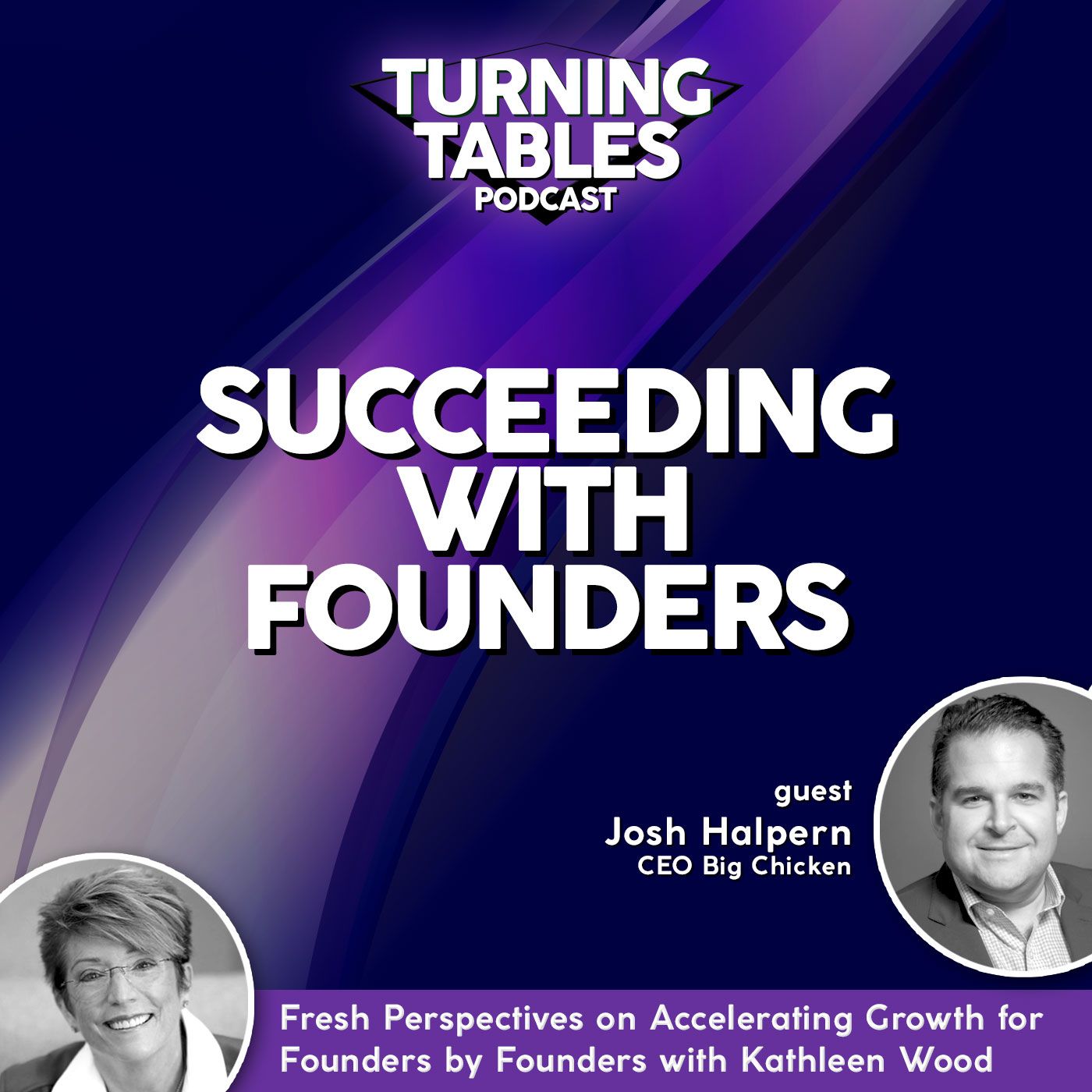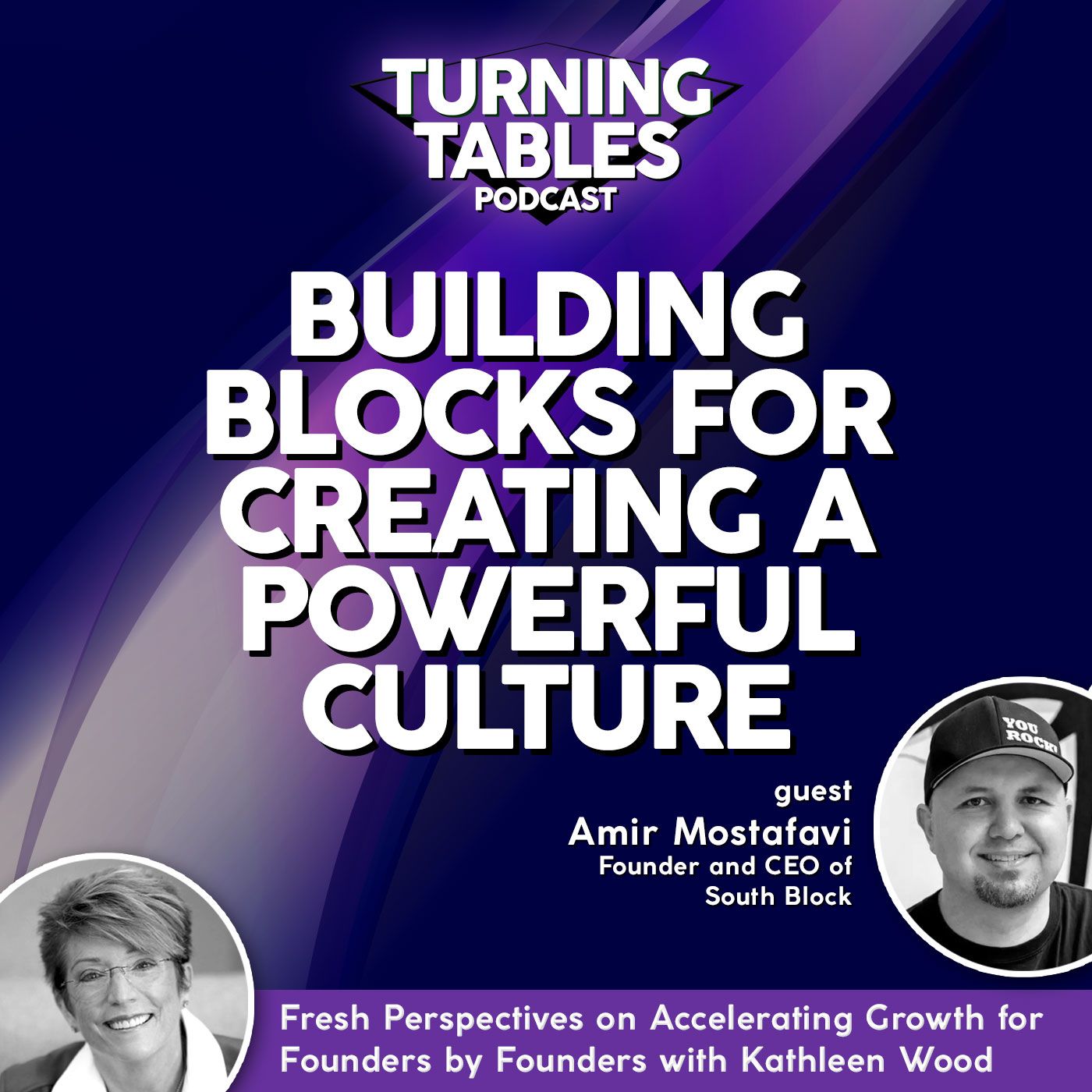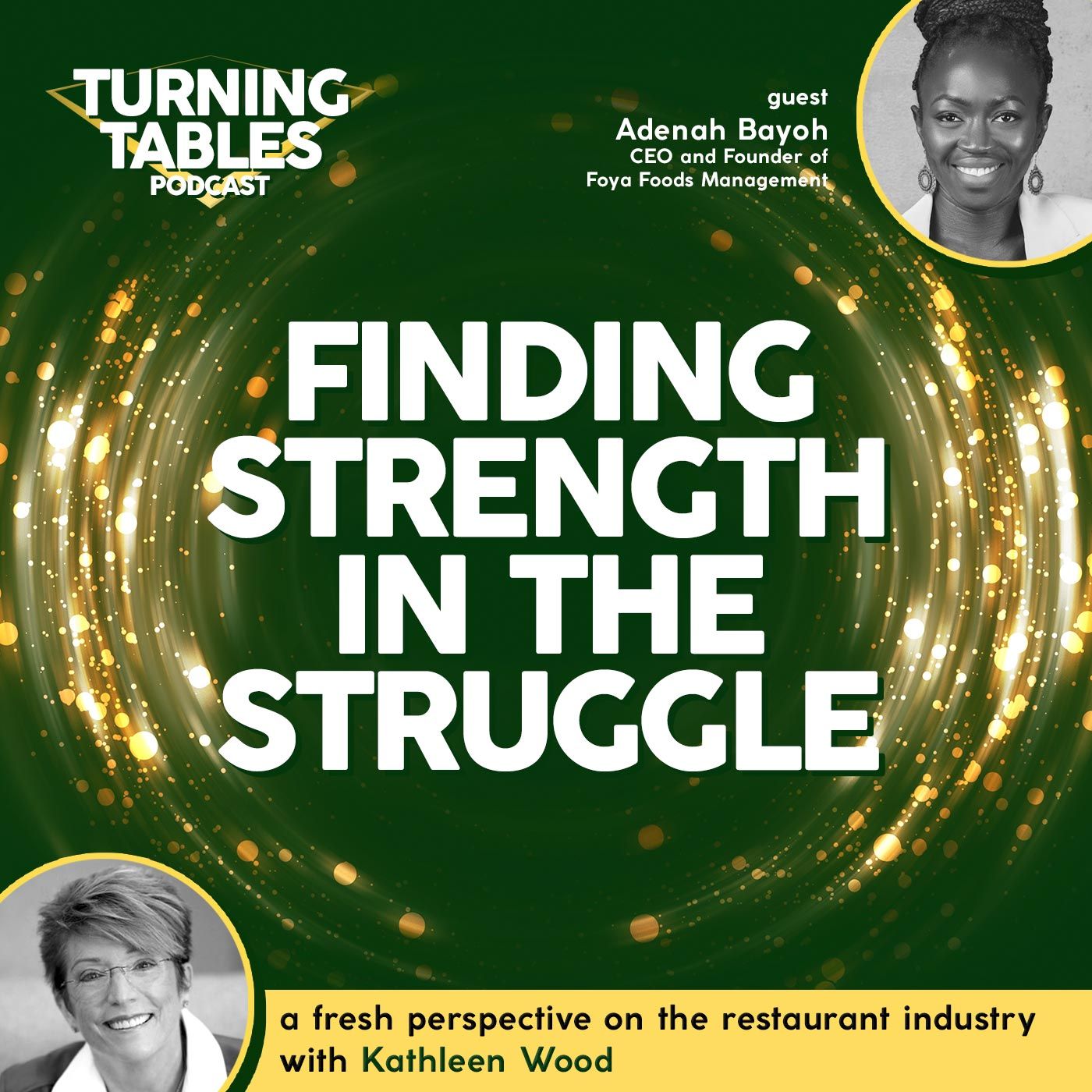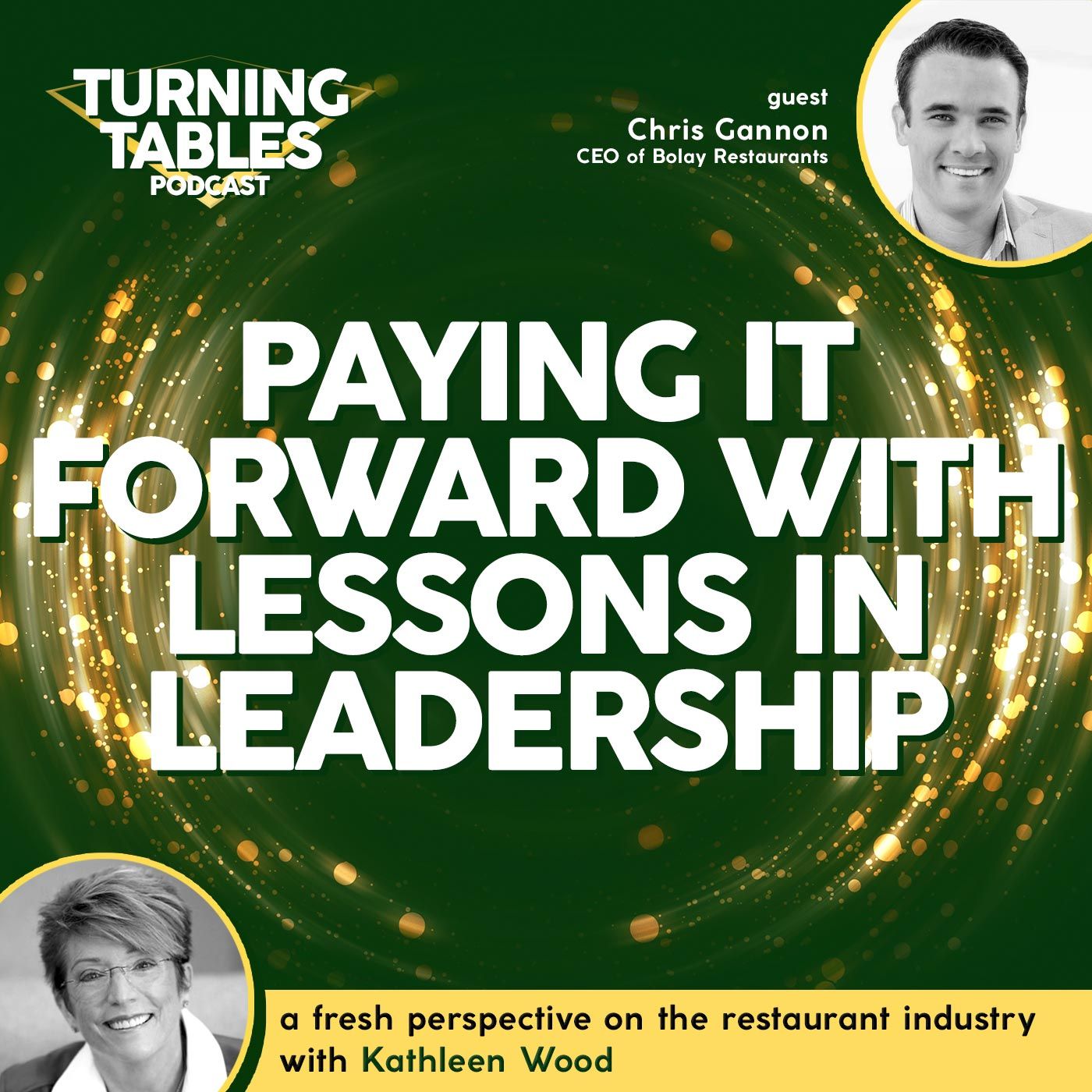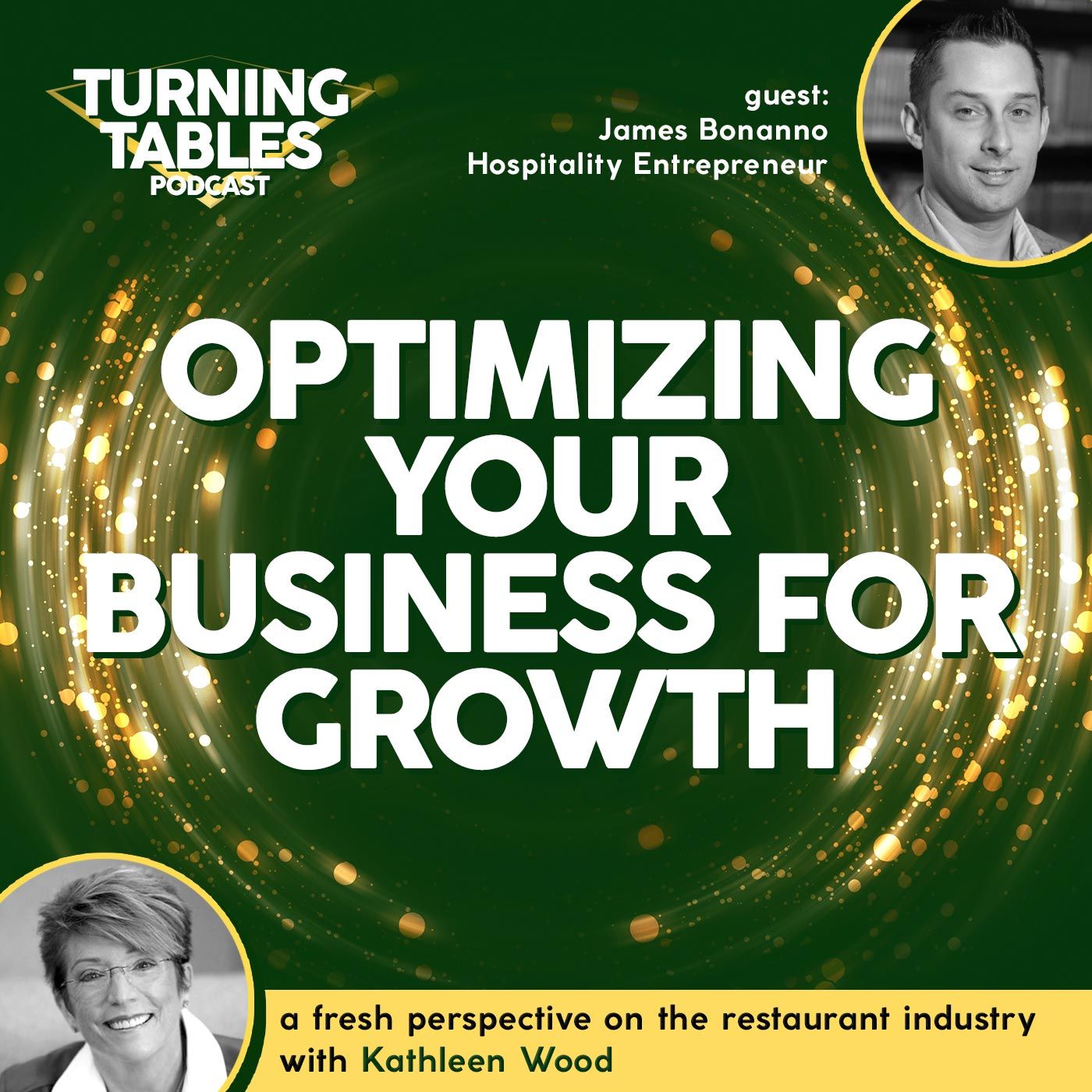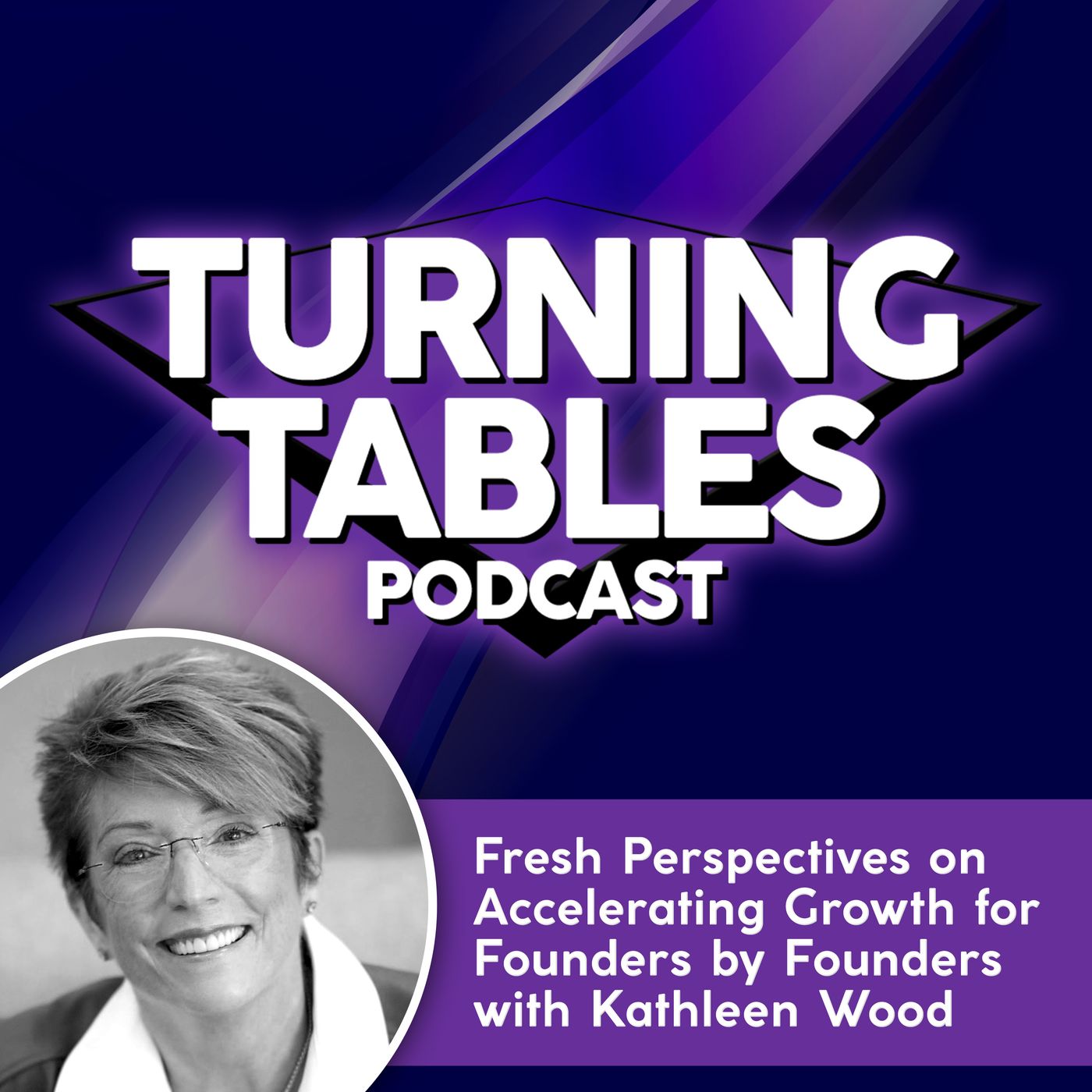Discover The Turning Tables Podcast
The Turning Tables Podcast

The Turning Tables Podcast
Author: Savor.fm
Subscribed: 0Played: 1Subscribe
Share
© Savor.fm
Description
Looking for a fresh perspective on the restaurant industry? Turning Tables is the must-listen podcast for anyone in the restaurant industry looking to grow their business. Tune in for thought-provoking conversations with next-gen multi-unit restaurant leaders, as we explore new ways to accelerate your business to new levels of success. Tune in for engaging, interactive episodes that are practical and relevant to today's restaurant landscape.
17 Episodes
Reverse
In the latest episode of "Turning Tables," the hospitality realm got a masterclass in authentic Cuban culture, business acumen, and the fine art of juggling personal and professional roles. Hosted by Kathleen Wood at the Prosper Forum in Amelia Island, Florida, the episode zoomed into the spirited world of Daniella Senior, the brain behind Colada Shop.From her initial plunge into the culinary world, sparked ironically by her parents' culinary ineptitude, to running multiple ventures, Daniella's journey is a testament to passion, perseverance, and the undeniable allure of Cuban flavors. Those in the restaurant industry know it's not just about the food, but the ambience, the experience. Daniella's unique take? Make it an all-day affair! Her Colada Shop is designed to transition seamlessly from your morning coffee fix, through a hearty Cubano sandwich at lunch, to the evening's mojito.Yet, this episode wasn't just about food. It was a deep dive into the DNA of Cuban hospitality. The term "Cubanism" shone brightly as Daniella described it – treating every guest as if they were family. It's not just about serving meals, but memories. This philosophy, she says, helps set her establishments apart in the diverse DMV area.According to our dynamic CEO, networking is indispensable in the hospitality sector. Daniella's heartfelt connection with people has fostered a supportive network. And, as she tackles the jigsaw of business and motherhood, she introduced a refreshing perspective – the idea of work-life "incorporation" as opposed to "balance." Her counsel to other ambitious souls? Fuse your personal and professional realms, let one feed off the energy of the other.Furthermore, Daniella highlighted a cornerstone of her leadership—empowerment. A crucial tidbit for those in the restaurant industry: nurture your team, let them flourish, make decisions, and yes, even stumble. Because in those stumbles often lie the seeds of unparalleled innovation.This episode isn't just an earful; it's a soulful peek into what makes a restaurant truly resonate with its patrons. As Kathleen signed off, with an infectious enthusiasm to visit the Colada Shop, many listeners would've earmarked it too. And for our hospitality mavens and restaurateurs, Daniella's journey is a reminder that success is a savory blend of authenticity, perseverance, and the magic of human connection.
Don't miss the latest episode of The Turning Tables podcast, where innovative leaders share new rules for success in the competitive restaurant market. Host Kathleen Wood sits down with Big Chicken CEO, Josh Halpern, to discuss leadership, growth, and building great brands. Big Chicken, founded in 2018, is backed by JRS Hospitality, Authentic Brands Group, and basketball star Shaquille O'Neal. It blends O'Neal's childhood favorites with trendy flavors, from crispy chicken sandwiches to Cheez-It® crusted mac n' cheese, each telling a story about O'Neal's life and personality.In this episode, recorded at the Prosper Forum conference in Amelia Island, Florida, Josh shares the successes of recent openings, particularly in Rosemont, Illinois, and Baton Rouge - their first casino location. He emphasizes Big Chicken as a partner-first company, focusing on incredible food and service, good unit-level economics for franchisees, clear communication with suppliers, and continuously pushing culture, marketing, and capabilities boundaries. He underscores the importance of making the right decisions for franchisees, ensuring their success and continuous improvement. This approach, he believes, will drive Big Chicken's growth and positive energy. He also talks about collaborating with Stan's Donuts and using drone lights innovatively at the Baton Rouge opening.Kathleen and Josh delve into various topics, including keeping franchisees engaged, avoiding apathy, and the challenges of scaling a business. Josh emphasizes the importance of continuous improvement, good communication, and creating a clear, transparent ecosystem for all stakeholders. He also discusses the importance of not just focusing on numbers but also staying true to the company's values and ensuring franchisees are in the best possible position. They also discuss Kathleen Wood's book, "Founderology," and the challenges faced by founders and CEOs when scaling a business while maintaining the founder's vision. Josh shares his experiences taking over Big Chicken when it had two units and the adjustments needed to scale the business while maintaining the founder's mentality.The conversation highlights key challenges and considerations for scaling a founder-led business, such as maintaining quality and consistency, balancing vision and adaptability, clearly defining roles, understanding before making changes, and balancing bureaucracy and flexibility. It underscores the importance of communication, empathy, and a collaborative approach when scaling a founder-led business. It's crucial to respect the founder’s vision while also making necessary adjustments for growth. This involves clearly defining roles, understanding existing processes, and gradually implementing changes that enhance efficiency and effectiveness while staying true to the original vision of the business.They discuss the importance of embracing the founder's genius, being flexible, and making necessary adjustments for scaling. The speakers highlight the need to understand the founder's vision and the essential elements that make the company unique while also implementing efficiencies and processes that enable growth. They acknowledge the importance of staying true to the "Founderology" principles in the face of rapid growth and express gratitude for the guidance provided by the book.Overall, this episode of Turning Tables podcast offers valuable insights for restaurant operators and hospitality professionals looking to scale their businesses while maintaining quality and staying true to their original vision. Tune in for practical insights and best practices from industry leaders who are successfully navigating these challenges.
In an era where authenticity and community engagement can make or break a business, restaurant and foodservice professionals have much to glean from the success story of South Block. In the latest episode of the Turning Tables Podcast, host Kathleen Wood, founder of Kathleen Wood Partners, invites Amir Mostafavi, Founder and CEO of South Block, to unpack the dynamics that have built his brand into a powerful player in the Washington, D.C. food scene.South Block's Story: A Journey of Growth and CommunitySouth Block, specializing in smoothies, cold-pressed juices, and açai bowls, has risen from a single juice bar on the GW University campus in 2004 to 15 thriving locations today, including a partnership with Amazon's East Coast headquarters.But what truly resonates in Amir's journey are the inspirations drawn from his family's video rental business and his father's story of resilience and adaptability. These early experiences instilled in Amir a determination that led to the development of the culture within South Block, marked by growth, discovery, and intentional design.South Block's "Great 8" RulesThe "great 8" rules, including the quintessential "don't be a jerk," reveal a business philosophy that goes beyond profit margins. They reflect a commitment to quality, community involvement, and the desire to create positive experiences.These principles have driven South Block's remarkable growth, even in unexpected locations, with the opening at Amazon's location standing as a testament to community connection and reputation building.A People-First CultureAmir's approach to business emphasizes prioritizing the community and the team. This people-centric perspective has paid dividends in employee recruitment and retention, even forming the core of his "Put Your Team in Your Dream" philosophy.Unlimited PTO, profit sharing, and the creation of paths and opportunities for team members speak to a broader vision. For Amir, South Block isn't just about juice; it's about people and culture.Why You Should Tune InWhether you're an established restaurant owner or an aspiring entrepreneur, this episode promises a treasure trove of insights:Innovation and Determination: Learn how a $30,000 line of credit turned into a thriving 15-location business, thanks to Amir's entrepreneurial spark.Culture by Design: Delve into the significance of building a culture that resonates with both team and community. Amir's fusion of intentionality, authenticity, and community engagement offers a masterclass in creating a meaningful business culture.Practical Perspectives on Success: From sharing business benefits with the team to recognizing the need to pause and intentionally design culture during rapid scaling, Amir's lessons hold real-world applications for businesses at any stage.Amir's conversation with Kathleen Wood transcends mere business talk. It's a profound exploration of the role of culture, a rich tapestry of personal experience, and a testament to the power of staying true to core values.So if you're keen on making connections, building a unique brand, or simply inspiring your team, this episode of the Turning Tables Podcast is not to be missed. Tune in to be a part of a discussion that's more than a business story; it's a lesson in connecting and giving back to the community, one block at a time.
On the latest episode of the Turning Tables Podcast, host Kathleen Wood, founder of Kathleen Wood Partners, sat down with Scout Driscoll, founder and CEO of the award-winning Chicago branding agency, DesignScout. With over two decades in the industry, DesignScout specializes in transforming both emergent and established restaurants into personality-rich, Instagram-worthy brands. Notably, DesignScout is a 100% woman-owned and operated business.During the conversation, Driscoll emphasized the importance of branding and how it communicates a company's personality. Using her client Benjyehuda as an example, she detailed how a confusing brand identity can hinder growth. The successful rebranding, which involved understanding the owners' preferences, led to a 40% increase in sales.Driscoll's agency thrives on fostering an "owner-occupied" brand - one that is not wholly owned by private equity or venture capital but has a passionate founder at the helm. This approach leads to authentic and well-defined brands that not only serve as morale boosters but also significantly impact the company's financial success.Driscoll and Wood also delved into key themes central to building a great brand. Understanding consumers beyond quantitative data, the importance of a brand's point of view, and the role of boldness in branding were among the topics discussed. Driscoll highlighted the need for brands to strike a balance between embracing technology and delivering a memorable guest experience. She concluded by underscoring the necessity of a substantial upfront investment for brands planning to expand.DesignScout has an impressive portfolio, with clients such as Cooper's Hawk Winery & Restaurants, Protein Bar + Kitchen, and Goddess and the Baker. Scout Driscoll, known as a thought leader in the industry, has served as a panelist for the Beverage Tasting Institute's International Packaging Design Awards and a judge for the Restaurant Development + Design Magazine Awards.Key takeaways from the conversation included:The Need for Authenticity: The "owner-occupied" brand, as Driscoll defined it, prioritizes authenticity. This model empowers founders who are fully invested in their brand's vision, ensuring that this vision permeates all branding elements. By doing so, they can resonate more effectively with their target demographic, rather than attempting to appeal to everyone.The Power of Bold Branding: Driscoll advised businesses to embrace bold branding. This involves making the brand visible everywhere possible and ensuring every visual touchpoint tells the brand's story. She reassured that while investing heavily in design might seem daunting, it is necessary for businesses aiming for growth and will yield returns in the long term.The Significance of "Brave Founders": Driscoll pointed out the importance of bravery in brand messaging and visuals, underscoring the need for founders to be 'all in' and authentic. This characteristic helps businesses connect more effectively with their customers, enhancing the overall brand experience.To hear Driscoll share her one piece of advice and turn the table on Wood, tune into this episode of Turning Tables Podcast.
In the latest episode of the Turning Tables podcast, host Kathleen Wood, founder of Kathleen Wood Partners, provides an in-depth look into the strategies her firm uses to transform small businesses into major industry players. Entitled "Six Keys For Accelerating Your Growth," the episode is a solo session where Wood shares her experience and insights from working with companies like Raising Cane's and Walk-On's Bar and Bistreaux.Wood discusses the three primary criteria for choosing clients: 1) they must be people who aspire to do great things with their businesses, 2) they should demonstrate a willingness and grit to make tough decisions for growth, and 3) there should be a mutual understanding that combining the expertise of her firm with the client's business expertise can lead to growth and success.She also discusses the "Power of 1," a system developed by her firm to support leaders in accelerating growth and scaling their businesses. The system's development was inspired by her studies of professional sports teams that have sustained success and developed a legacy of leadership, like the Green Bay Packers and the New England Patriots.Kathleen Wood dives deep into her multi-faceted investigation of success patterns across professional sports teams, collegiate sports teams, top-tier business organizations, and her personal client base. As she delved into these realms, she started to see a shared DNA among all these groups that consistently reached the top. However, skeptics would question her focus on sports and large-scale companies, pointing out the resources and funds at their disposal. Kathleen acknowledged this and, in response, chose to study her own diverse client base, small and big, providing a more comprehensive perspective.Kathleen discovered that the most successful businesses, teams, and organizations had something profoundly in common: they all had crystal clear clarity and a thousand percent alignment. These elements formed the bedrock of unstoppable momentum. However, she realized that merely advocating for clarity and alignment could lead to being overlooked as a consultant, as these elements were not the magic bullets many were seeking.Upon further investigation, Kathleen noticed another key aspect: every successful team and organization shared six key ingredients. If a team or business could achieve clarity and alignment around these six ingredients, they were on the path to creating a championship team, sustained success, and a leadership legacy.Don't miss the opportunity to delve into Kathleen Wood's groundbreaking discussion on the 'Power of One' in the latest podcast episode. Discover in-depth insights on the compelling concepts of one vision, one team, one direction, one system, and one brand. This episode is a goldmine of actionable advice and profound insights, custom-made for individuals seeking to elevate their businesses and outshine the competition. Kathleen cordially invites you to join the conversation, share your thoughts and feedback, and together, let's navigate the exhilarating journey towards accelerated growth and unparalleled success in today's fiercely competitive business world. Tune in now, and let the transformation begin!
An underdog mindset is a powerful tool that can help individuals achieve success in the restaurant business. This approach is rooted in the belief that despite having limited resources, an individual can still emerge victorious by working hard, being creative, and remaining resilient. By adopting this mentality, restaurant owners and staff can approach challenges with a tenacious attitude and the determination to overcome any obstacle that comes their way. The underdog mindset also encourages individuals to take risks and think outside the box, which can lead to innovative ideas and solutions that set them apart from competitors. In a highly competitive industry such as the restaurant business, the underdog mindset can provide the drive and determination needed to succeed.In the latest episode of Turning Tables, host and growth strategist, Kathleen Wood, and her guest, Scott Taylor, chief executive officer at Walk On’s Bar and Bistreaux discuss the mindset needed to run a successful business today. Taylor has been named the President and Chief Executive Officer at Walk-On’s Enterprises Operations, LLC, a brand he's been associated with since 2010, having previously served as the President and Chief Operating Officer. During his tenure as President & Chief Operating Officer, Taylor focused on systemization and structure, building a leadership team that manages a best-in-class franchise organization. Walk-On's launched its franchise program in June 2014, and today operates 75 locations across 13 states, with plans to reach 100 locations by the end of 2024. Wood and Taylor take a deep dive into the underdog mindset and its impact on business. Taylor said, “So I think when you have an underdog mindset, you're not working against unrealistic expectations that are self-imposed right? Because you're always your own worst enemy and so you just work hard to get it done and there's not an expectation other than from yourself and you work harder, you work smarter, you work with humility and you embrace the people around you in a way that everybody wins.” Wood adds, “I can't think of a more perfect time in our industry to have that than right now because I really do think our industry is going through a pronounced and definitive period of change.” Wood shares, “There's a P&L that's called profit and loss and there's a P&L called people in leadership and I love the fact that you focus on the people in leadership P&L, and when you focus on the people in leadership you get the other financial P&L all profits less loss.”To learn more about how an underdog mindset can positively impact staff, franchisees and leadership as well as Taylor turn the table on Wood, tune in to this podcast on Spotify.
In the latest episode of Turning Tables, host and growth strategist, Kathleen Wood, and her guest, Hanson Li co-founder and chief executive officer of Lazy Susan talk about what the restaurant industry needs to do to close the gap between customers’ digital expectations and their current digital experience. Lazy Susan is a contemporary concept of Chinese American takeout company. Li says Lazy Susan, “this is an idea that is thirty-plus years in the making. My family first immigrated from Hong Kong to the states when I was twelve years old and my dad would often ask why isn't there a dominance of Chinese food. His point was that everyone gets Chinese takeout but there's no national brand.” Li talks about purposely designing the concept and operations around delivery and takeout. He notes that over ninety percent of Lazy Susan’s sales are delivery and takeout. The delivery experience is extremely important and Li shares, “If you want to go out to a great Chinese meal, there are great Chinese restaurants that we can go out to. But if you want a lazy night in on a Wednesday night I want you to remember Lazy Susan. So we have great digital ordering, we have curbside pickup, and we have good packaging that carries our food.” Wood and Li address the gap between digital expectation and analog adaptation. Li says “I think that the restaurant industry is literally the last big segment of our economy that has not gone through a digital transformation.” The discussion between Wood and Li takes a deep dive into having a digital relationship with your customers, having software that is streamlined to be more efficient and effective connecting the front and back of the house as well as capturing customer data through loyalty programs and feedback. To hear more about closing the digital and physical gap and Li turns the tables on Wood tune into this episode of Turning Tables Podcast on Apple Podcasts.
In the latest episode of Turning Tables, host and growth strategist, Kathleen Wood, and her guest, Blaine Hurst discuss lessons in leadership. Hurst is the retired CEO of Panera Bread, a member of the Fast Casual Hall of Fame, a four-time Fast Casual Mover and Shaker, author of 8 patents, and is regarded as one of the highest-impact restaurant leaders of recent times. Today Hurst is an active Executive Board Member of Hero Bread, an ultra-low net carb bread products company, and says that his real passion is people with intellectual disabilities. In March he will be speaking at the Franchising and Innovation Summit discussing the untapped labor pool. He said, “ this emerging population that are very hireable that are very dedicated that walk into your building every day with joy and I just think there's a huge opportunity.” Wood refers to Hurst as a visionary, a trailblazer, and an innovator that is trying to bring a whole new generation into the workplace. Wood and Hurst talk about the power of a culture that's never satisfied and Hurst shares his perspective saying, “I call that culture of dissatisfaction and people sometimes react to that negatively, to me it's quite the opposite and it's actually a very positive trait.” They break this down and relate it to today’s operator and the choice of prioritizing the changes to make improvements. Hurst says, “so my recommendation to the restaurant manager is to make a choice about what matters most and I will guarantee you it's people first I guarantee you there's really no debate about that in my head because people are the underlying foundation of great operations.”Hurst talks about working with ClemsonLIFE (Learning Is For Everyone) which is a post-secondary education program with the specific purpose of helping young adults with intellectual disabilities. He is also an investor and advisor in the Sheperd Hotel and Delish Sisters restaurant in downtown Clemson where 40% of the staff are people with intellectual disabilities. To hear about Hurst’s tagline, running the race with joy, and its significance as well as its impact tune into this episode of Turning Tables Podcast on Apple Podcasts.
In the latest episode of Turning Tables, host and growth strategist, Kathleen Wood, and her guest, Nichole (Cole) Robillard, Chief Marketing Officer at Smokey Bones discuss industry insights, staying competitive and being a marketing leader with a challenger’s mindset. Robillard joined Smokey Bones in 2021 as Vice President of Marketing as a results-driven leader with extensive experience in multi-unit organization growth. Her current role is Chief Marketing Officer where she has led Smokey Bones to a record-breaking year for comparable store sales in 2021. FSR Magazine has recognized Robillard as one of the 13 Most Influential Marketing Leaders in the Restaurant Industry. Robillard says, “I’ve traveled a bit of an unconventional path to get to where I am today. I started out my career on the agency side, working in advertising agencies, promotions agencies and even did a little bit of PR.” She shares that she consistently worked on restaurants as well as food and beverage accounts and had a love and passion for the industry.During a pitch to Smokey Bones, Robillard connected to the brand and says she fell in love with Smokey Bones and had been striving to work for a great brand on the client side. She became a customer of the restaurant and discovered things about the experience within the restaurant that didn't connect for her. She says, “that all started to change a few years ago, 2019, which I later learned was because they brought in a new executive team. Our new CEO James O'Reilly came in the spring of 2019 and slowly started changing the business and the executive team and ultimately sort of changed what the brand stood for.” Wood asks Robillard how she has been able to translate her past experiences into the exciting things she is doing with Smokey Bones. Robillard shares “food has definitely been a big passion of mine throughout my life, I've always really loved the power that food has to bring people together.”To hear more on the innovation that Robillard is leading at Smokey Bones, industry insights and Robillard turn the tables on Wood, tune into this episode of Turning Tables Podcast on Apple Podcasts.
In the latest episode of Turning Tables, host and growth strategist, Kathleen Wood, and her guest, President and Chief Executive Officer of Native Foods, Carin Stutz about guiding and mentoring the next generation of leaders in the industry. Stutz has served as Executive Vice President and Chief Operating Officer of Red Robin, President of McAlister's Deli, CEO and President of Cosi, President of Global Business Development for Brinker International, Executive Vice President of Operations for Applebee's International, the Pacific Division Vice President for Wendy's International, Regional Operations Vice President for Sodexo, U.S.A., and was Vice President of Corporate Operations for NutriSystem, Inc., prior to joining Native Foods. Wood asks Stutz about her secret to success, she says, “You can go out and find money, you can figure out how to fix the brand, you could find real estate, although they're all expensive and they're all equally challenging but people are the key.” She adds, “so having a good pipeline of talented people who believe in the mission and people who believe in the brand certainly makes any path to growth much more manageable and much more successful.” Stutz talks about how she approached mentoring in the past as opposed to how she mentors now. She says in the past the conversations would address leadership competencies and now she finds the one big thing that can make a huge impact when working with an individual. They talk about GLEAM Network which is a non-profit, volunteer-based organization that's mission is to provide mentorship and leadership development to the underserved community in the restaurant and foodservice industry. Stutz says, It's the people on the front lines, management and middle management that aren't necessarily getting the development that they need. She adds, it started out during the beginning of Covid. We saw a lot of people in our industry unfortunately being laid off and we were all getting a lot of calls asking for help.To hear Stutz talk about her drive to keep making an impact, what leaders should focus on in 2023 to increase their probability of success and Stutz turning the table on Wood, tune into this episode of Turning Tables Podcast on Spotify.
In the latest episode of Turning Tables, host and growth strategist, Kathleen Wood, and her guest, Peter Sclafani, chef, restaurateur, chief executive officer and founding partner of Making Raving Fans Hospitality Group have an insightful discussion on customers, service and most importantly hospitality. Making Raving Hospitality Group has four restaurant concepts Jubans Restaurant, Portobello’s Grill, P-Beau’s, and SoLou. Sclafani says, “I'm a third generation chef and restaurant tour. My grandfather started as a chef in the 1940s and he had his own restaurant.” He adds, “my family lived above the restaurant, so everybody worked in it. My dad ended up going off on his own and creating his own restaurant and I started working there when I was a little kid and one of my earliest memories is standing on a milk crate washing dishes in a three compartment sink and I was just so excited to be a part of the team.” Wood askes Sclafani what is happening to hospitality in our industry now and he says, I'd start with my history. I grew up in a family restaurant and the restaurant was named after us, so the brand was extremely personal. Nobody taught me that we have to focus on hospitality. We have to focus on how we make people feel, we were protecting our family name so it just came naturally.” Sclafani talks about service and its importance but more so how hospitality is what separates brands. He shares “It's about the way they make you feel, it's the story, it's something that was done a surprise and delight that was a little bit extra. That's what people talk about .So I feel so strongly about it that we named our company Making Raving Fans and that's what we focus on everyday.” Sclafani talks about delivering that kind of hospitality so guests will talk about the restaurant and want to come back. “I think hospitality is so important. There's been a shift in the industry. We know there's this labor crunch and a lot of people that are out there that are coming into the hospitality industry are first timers and they don't have that experience. They haven’t seen it before and they're learning the steps of service. We've realized we have to do a better job at explaining hospitality.” Sclafani says. To hear Sclafani share more about the importance of hospitality and steps to teaching it to the team as well him turning the table on Wood, tune into this episode of Turning Tables Podcast on Apple Podcasts.
In the latest episode of Turning Tables, host and growth strategist, Kathleen Wood, and her guest, Brant Menswar, entrepreneur, author and speaker. He is also CEO of Booky Call the world’s first book discovery app and co-host of the wildly popular podcast, Thoughts that Rock as well as author of the book Black Sheep. Menswar spent twenty years in the music business with two different bands, two record deals and toured the world. He talks about making a change and he says, “I found myself with an opportunity to say gosh if I could help other people discover what matters most to them including myself, we could avoid these scenarios when when life throws you a curveball get yourself on a solid foundation to make great decisions and that's what sort of led me on the journey to write Black Sheep.” Menswar explains Black Sheep and says it is a metaphor. He adds, “I was 47 years old when someone finally took the time to explain to me why farmers don't value black sheep like the rest of the flock and you know I think most of us when we think black sheep think of an outcast of some kind. And the truth is that farmers don't value black sheep like the rest of the flock because a black sheep's wool cannot be dyed so in effect every black sheep is 100% authentically original.” Wood and Menswar talk about taking his book to the next level by helping companies and organizations to find their flock of five values to create high performing teams and culture. Wood says,”I happen to personally believe that culture undeniably is one of the greatest competitive advantages that any business or organization can have.” “There is a video that I absolutely love,” Menswar says about the rehearsal video from the Greatest Showman. He adds, “the movie was the Greatest Showman and this was a rehearsal where the cast was singing a song for the financiers to try to get this movie financed to to get a green lit.” To hear the discussion around the video, get more details on the importance of the five values and Menswar turn the tables on Wood, tune into this episode of Turning Tables Podcast on Apple Podcasts.
In the latest episode of Turning Tables, host and growth strategist, Kathleen Wood, talks with her guest, Adenah Bayoh, CEO and Founder of Foya Foods Management, parent company of IHOP Franchises and co-owner of Cornbread, a fast-casual farm-to-table, soul food restaurant about finding strength and becoming a successful entrepreneur. Bayoh, a native of the country Liberia, talks about working at her grandmother’s restaurants in Liberia when she was young. She says, “When I was a little girl in Africa in a little village in Liberia in West Africa named Foya owned a restaurant and I worked there. I waited and bused tables selling the marketplace and I was seven or eight years old.” Bayoh at age thirteen escaped the civil war in Liberia and immigrated to the United States. When Bayoh came to the United States, she worked at McDonald’s as a cashier. Bayoh says “ the McDonald's that I worked at was actually owned by the very first black franchisee for IHOP in the Northeast.” She continues to say, “I went up to college and went on to do amazing things in banking and fast forward, now I'm leading this brand Cornbread that I too want to be the very first african-american woman to lead a franchise concept. I want to be able to change and be disruptive in the franchising space.” Wood tells Bayoh, “I just want to tell you I mean it is powerful. I could listen to you tell your journey every single day and find another reason to be inspired, another reason to get fired up about our industry. But also another reason to be inspired to do what you want to do which is to continue to disrupt it and one of the things I've always appreciated about it is you know you and I have had a lot of discussions and I always take so much away from our discussions.” Bayoh has applied her life lessons through her journey into her business. Wood talks of Bayoh’s mantra and philosophy, finding the strength in the struggle. Bayoh shares what finding the strength in the struggle means to her, she says, “I think finding strength in the struggle essentially means that often when we're in the space of building and building and building, sometimes we encounter obstacles, we encounter things that we think is going to be our end all be all and what I say to myself all of the time, whatever is happening to me is happening to me so it can build my strength, so it can prepare me for that leap for that next great big thing that is on the horizon for me.” To hear Bayoh’s advice plus how she turns the table on Wood tune into this episode of Turning Tables Podcast on Apple Podcasts.
In the latest episode of Turning Tables, host and growth strategist, Kathleen Wood, and her guest, Chris Gannon, chief executive officer and cofounder of Bolay Restaurants, a fast-casual dining concept that delivers fresh ingredients and bold flavors. Gannon was born and raised in New Orleans, the birthplace of hospitality, big bold seasonings and flavors, the big easy and just the good times. He talks to Wood about growing up in a home that was dedicated to hospitality. Gannon comes from a tradition of restaurant innovators, his father and Bolay cofounder Tim Gannon in 1988 founded Outback Steakhouse. He shares, “My father, I was blessed.” Growing up Gannon got to watch how his father grew an amazing culture and inspired people across the nation with the blooming onion, big bold flavors, great steaks and just taking care of people. “When I felt ready, I took a stab at it with my father helping us and we created a Bolay,” says Gannon. In 2016 they opened their first Bolay and they had a line out the door. He tells Wood how he remembers his father telling him he has another site. Gannon says, “that's my father's passion to grow and think big is what gave us the courage to build 22 restaurants in 6 years.” Wood and Gannon talk about the challenges of the last two years. Gannon says, “It's been a journey you know, up until 2019 everything was just easy and in the past two years we got to go through a crash course and they don't teach you what we've had to deal with in the past two years in business school or any school.” He adds, “I talked to all my mentors and they don't have answers because they've never been through it either. So it's been a pretty interesting journey, but I will tell you I feel as if it's made us stronger. It's made us better leaders. And you know, in the moment I hate it because our backs up against the wall but looking back on it, someone always says that comment, what doesn't kill you makes you stronger and it's weird, but it's so true. You know what doesn't kill you makes you stronger so we have been getting stronger through this process.” Gannon talks about giving back to his employees and shares why Bolay is closed on major holidays. He says, “I just said why are we doing this. Let's make sure we let our teams enjoy their Fourth of July so we closed our entire company on the Fourth of July and all major holidays and you know you look back and like oh well, you know we're gonna miss those sales but what you give back to your people is magical and then they bring that energy on the other days that you're open.”To hear Wood and Gannon talk about leadership plus Gannon turns the table on Wood, tune into this episode of Turning Tables Podcast on Apple Podcasts.
In the latest episode of Turning Tables, Host and Growth Strategist, Kathleen Wood, and her guest, Rose Previte, Founder of Compass Rose and Maydan, sit down to discuss culture, entrepreneurship, and the importance of finding joy. Wood asks Previte to share a little about her background and why tables are literally important to her. Previte talks about receiving a table and chair set on her 3rd birthday from her mother. She shares how her mother taught her many lessons around that table, from sharing vulnerability to being hospitable and feeding people. She says, “I used that skill that my mother instilled early on to open two restaurants.” Previte is referring to her first two restaurants, Compass Rose and Maydan. She talks about having a new appreciation for American entrepreneurship and shares that she is in the process of opening two new restaurants in Northern Virginia, as well as one in Los Angeles, which is expected to open next spring, and she is currently launching a wine company.They talk about Previte bringing international food to the restaurant scene in the D.C. area and about exposing people to cultures they might never get to otherwise. Previte says, “I did want to break down barriers and create awareness about cultures, you know, through food and beverage, that Americans might not know about, and so that, that really, really makes me happy and that drives me.” She talks about Maydan being a Middle Eastern, 100% fire-based restaurant that was inspired by and dedicated to the beautiful women in her family who taught her to host and cook. Previte reflects on a time when she was in another career field, but how her heart just kept going back to food and hospitality. She talks about her dedication and passion for the industry and the joy that it brings to her. Wood says, “You can do a lot if you're passionate if you're energized by it, but if it's not bringing joy, then check why it's not. She adds, “Find the joy in all that you do and you'll find a great life in the process.”Tune into the podcast to hear more from Wood and Previte about the labor market, professionalized employment, and creating opportunities for employees, or you can listen on iTunes Now!Produced by Lisa Pepe
In the latest episode of Turning Tables, Host and Growth Strategist, Kathleen Wood, and her guest, Hospitality Entrepreneur, James Bonanno, sit down to discuss the importance of having a growth mindset and how to be a digitally forward leader in today’s dynamic environment, while managing risk and streamlining processes.When Wood asks Bonanno about his experience in the industry, he talks about his early start in food service at the age of 14, and says that he, “grew up in the front of the house.” where he initially waited on tables and then went into bartending through his early 20’s. They talk about Bonanno opening his first Tap Room location in 2011, which was a new concept in the space, bridging the distance between restaurant food and the feel of a local pub. In addition to owning Tap Room, he co-founded the quickserve concept, Bango Bowls, which features fresh menu items like salads, Poke bowls and smoothies. As CEO of Upstream Hospitality Group, Bonanno oversees the growth of both brands which he says continue to scale. He shares that Bango Bowls currently has 6 locations, and that the 4 existing Tap Room locations are projected to grow by an additional 50 units over the next 10 years. Wood and Bonanno discuss the importance of having a growth mindset. They chat about how all businesses have challenges that will inevitably include road bumps along the way, and why the key to overcoming obstacles involves both personal development, and consuming data through a variety of different mediums, such as books, podcasts and live events, which not only grow your mindset but also help to prepare you for the really difficult times. Bonanno says, “If you don't have that really strong mental mindset and that mindset on growth, then you know some of those bumps can turn into speed blocks, right? And you might fold, or you might stop when you're so close. But not having that strong conviction that ‘hey you know this is part of the journey’, and I have that mentality to lead other people around me and kind of get through this. You really have to elevate where your growth mindset is.”Bonanno talks about streamlining processes and staying digitally forward. He believes that operators need to analyze every single piece of their business to know how they are executing in each area. Bonanno adds that for literally every aspect of the business, there is a technology available to make the process easier. He shares a few examples, such as using software to streamline scheduling, offering phone based applications for recruiting and utilizing app based training options. He says online ordering should be as seamless as the in-store experience. Wood adds. “Search out those solutions that can either make it better, faster, stronger or more efficient and then recognize that some of these solutions don't have to be huge and super expensive. They can be super cost effective and be very powerful in and of itself.”They talk about company culture and Bonanno asks Wood for some ideas on keeping and strengthening culture as a brand scales. She shares that in her 20 years of working with amazing brands, there are a few things about culture that she really believes. She says, “One is that culture can't be stolen. Everyone thinks that you could steal people, the recipes, the concept, but the one thing that can't be stolen from a brand or a concept or business is really its culture. And, a healthy culture can accelerate growth, a toxic culture can either derail the growth and in some instances I've actually seen where it's imploded the business.” She talks about when companies think about growth, and business development, their leaders need to define their purpose, mission, vision and values, while putting the same amount of time into building the brand as they do into growing the culture. She says, ”Bad marketing may hurt a company but a poor culture can definitely stop a company from moving forward.”Tune into the podcast to hear more from Wood and Bonanno about company culture, customer experience and tech stack, or you can listen at iTunes Now!Produced by Lisa Pepe
The Turning Tables podcast features fresh perspectives from the innovative leaders writing the new rules for success in today's dynamic and competitive restaurant marketplace. Host and Growth Strategist, Kathleen Wood, and her guests invite you to pull up a chair and join the conversation as they turn the tables to share their best practices and practical insights on leadership, growth, and acceleration for building the next generation of great brands. In this episode, Wood talks with Paul Barron, Founder and Chief Executive Officer of Rever Networks about the launch of the latest Foodable Network podcast, Turning Tables. They discuss the new platform and what listeners can expect to hear on the show.Barron asks Wood to share more about her experience and the concept for Turning Tables. Wood talks about her background as a business growth strategist and spending her entire career within the restaurant industry. She talks about her experience of taking small businesses, turning them into big brands, and working with really great industry leaders over the years. Wood adds that the industry is currently facing a massive, rapid and exciting transformation. She says, “As I started to think about a podcast, I thought wouldn't it be refreshing to literally take two thought leaders and put them at the table, and have a discussion about these transformations, but allow both of us to bring our fresh perspectives to what this means not only for our businesses today but where our businesses are going in the future.” Barron and Wood discuss how the industry has morphed during the challenges it faced over the past two years, and the dynamic around how businesses are reformatting their entire model of how they do business. Barron says, “It's as if they were startups again.” Wood shares that her intent for the podcast is to provide fresh ideas and perspectives from industry leaders who are writing the new, practical rules for success that actually work. She says, “I believe that these leaders are going to bring forward ideas that people will be able to use and apply once they're done listening to the podcast.”Tune into the podcast to learn more about the new show and what’s coming on this season of Turning Tables or you can listen at iTunes Now!


